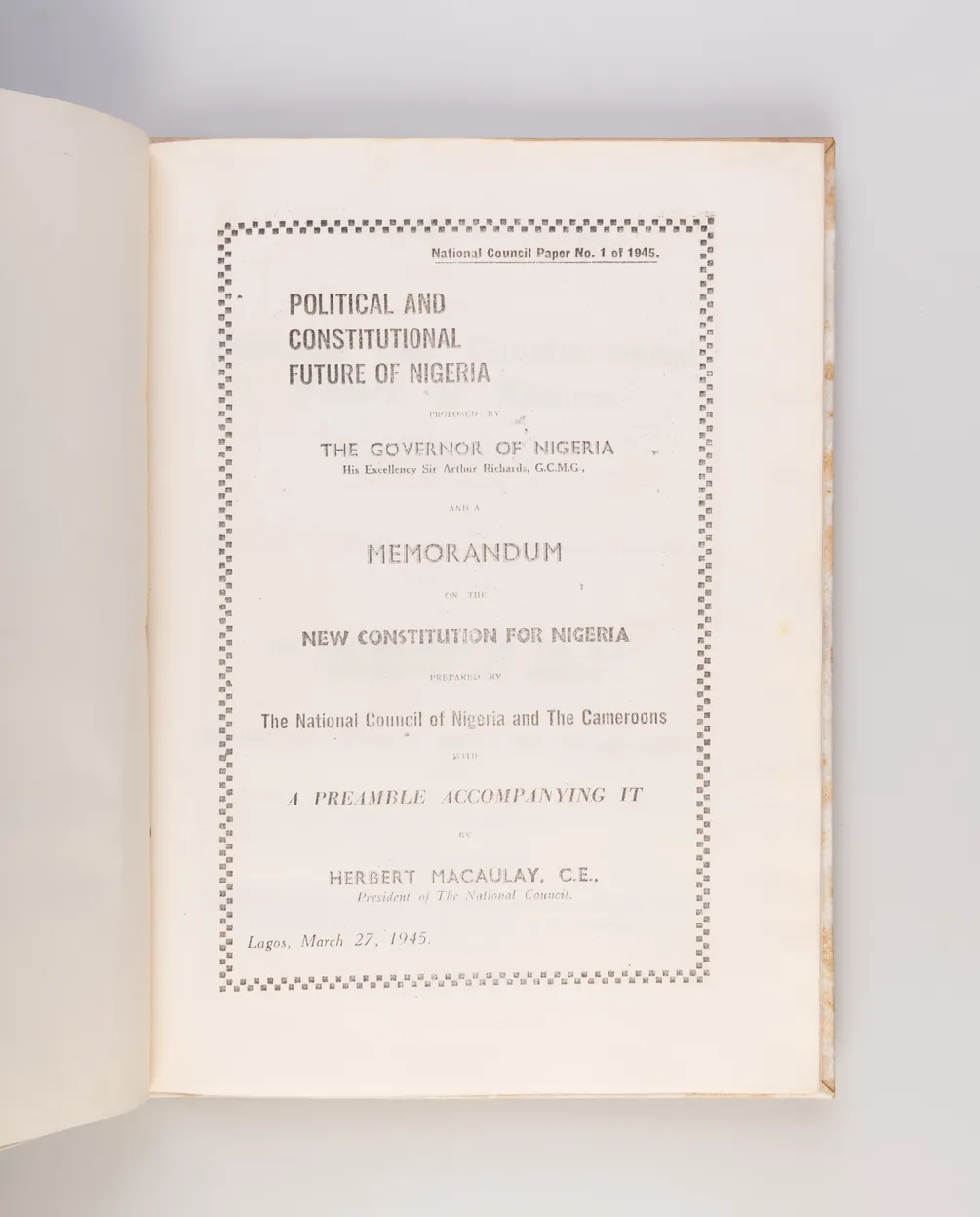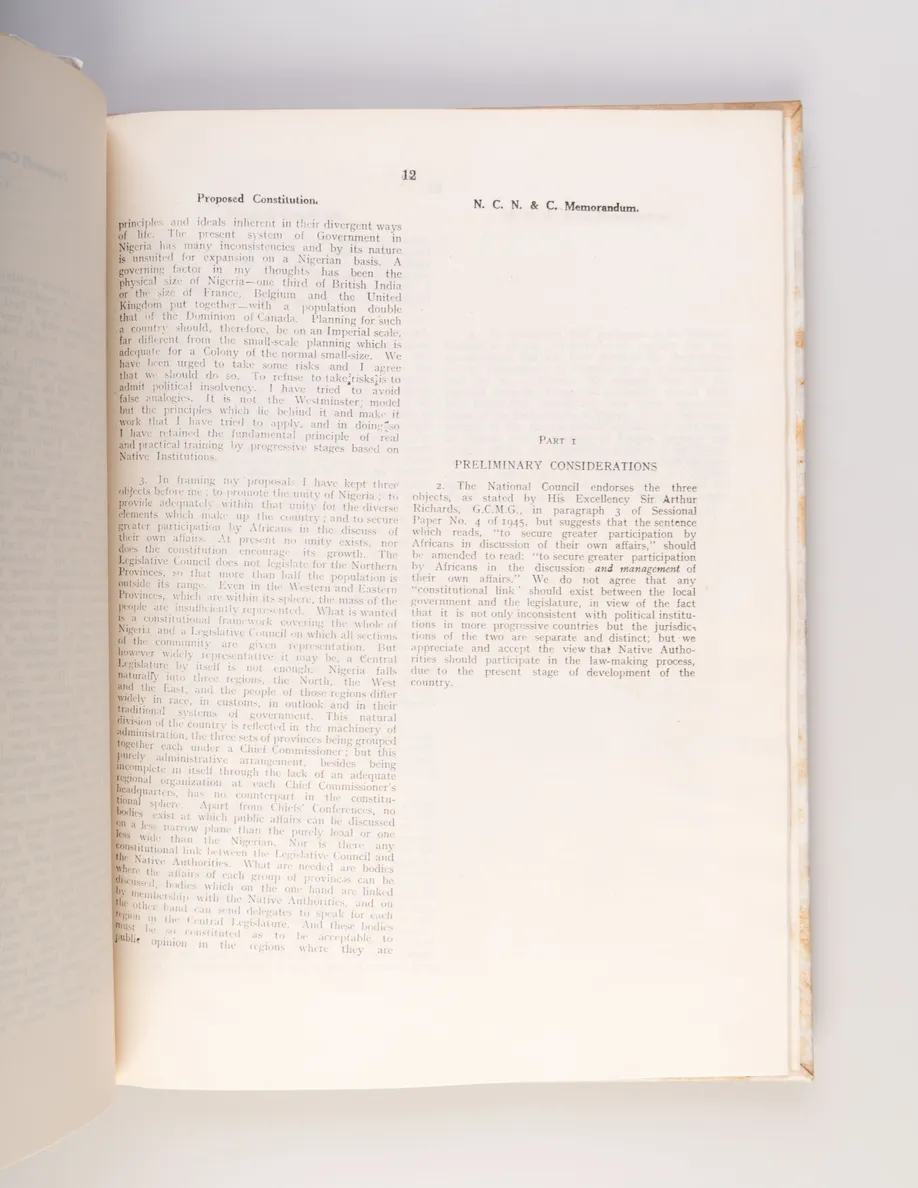Rare and important: Nigerian nationalist Herbert Macaulay's (1864-1946) pointed critique of Sir Arthur Richard's proposed constitution for Nigeria. Here the original paper has been reprinted in double column with Richards' text on the left and Macaulay's annotations on the right. Macaulay has also added a seven page introduction.
Richards served as Governor of Nigeria from 1943-1948 and in his proposed constitution sought to recognise the then distinctive administrative regions in the north, southwest and southeast. However, this seemingly innocuous proposal coincided with the "crystallization of ethnic nationalism in Nigeria. The territorial administrations that coincided with the home base of each of Nigeria's three main ethnic groups. The west became coterminous with Yoruba ethnic group, the east with the Ibo, and a residual north with the F Hausa ethno-political cluster. These three territorial regional administrations were transformed into territorial, ethno-political and regional identities" (Ifidon, 115). The three groups all vied for future control over a soon to be independent Nigeria. "Thus emerged the most significant structuring factor and basis of continuity in Nigeria's political history" (ibid).
Macaulay, who was then president of the National Council of Nigeria and the Cameroons, writes in the preface: "it is advisable, in our humble opinion, not to lose sight of the dominant factor that there exists in both the Northern and Southern Territories such marked ethnological and traditional divisions between the numerous tribes that it would not be advisable to attempt a premature unification in hasty advance of the natural development in inter-tribal relations."
He notes the importance of giving "the people a definite share in the management of their own affairs both in the Colony and in the Northern and Southern Protectorates of Nigeria, at the same time to be gradually building up the structure of the Unity of Nigeria by a process of unforce coalescence, and by fostering Native Institutions in the two protectorates ..." And clarifies the wish that the people of these two territories are not classed as British subjects, but as British Protected Persons. Of course, colonialism was driven by both money and power, neither of which Macaulay shies away from. He notes Nigeria's oil rich deltas and that, in the British Empire, only India generated more wealth.
In this highly technical document, Macaulay's annotations repeatedly insist on a greater role for Nigerians themselves in the management and governance of the nation, and emphasises that the distinctions and nuances in Nigerian society aren't being recognised by the proposed constitution. Furthermore, he was critical of the reserve and veto powers granted to the Governor by Richards. In a battle familiar to independence movements across all colonial empires, this rare printed response is almost granular in detail.
Herbert Macaulay is recognised as the father of Nigerian nationalism. He was the founder and president of the National Council of Nigeria and the Cameroons (NCNC), though didn't live to see an independent Nigeria. However, following an ongoing series of reforms through the 1940s and 1950s, Nigeria became independent of Great Britain on 1 October, 1960.
OCLC locates a single example at Michigan State University. This is not to be confused with original paper itself, which is only ten pages, and is held at US State Department, Northwestern, LSE, Cambridge and the University of Leiden.
The work is further distinguished in previously belonging to J. Wayne Fredericks the former US Deputy Assistant Secretary of State of East Africa.
Ifdon, E.A., "Transitions from Democracy in Nigeria: Toward a Pre-emptive Analysis" in African Journal of Political Science Vol. 7, No.1 (June 2002), pp.109-128.





